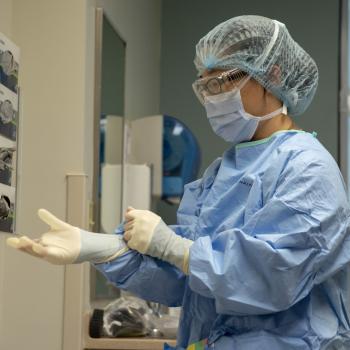 Deception is all around us. In order to live in the world, we have to find people whom we think we can trust and rely upon. This leaves us vulnerable, as we can easily give our trust to someone who does not deserve it, to someone who engages us solely for their own personal gain. It should not be surprising, given the way we live, that it becomes relatively common for us to find ourselves, time and time again, trusting people we should not. Whenever we voice our growing doubts about their actions or character, we let ourselves be taken in by their explanation, hoping that they are telling the truth. We do this because, often, we are correct in doing so; we can easily misread the situation, and the person who had previously earned our trust still deserves it, but this leaves us open to believing liars who seek something for themselves and who will end up hurting us in one fashion or another. Our good nature is easily turned against us. We should not be ashamed; even when everything becomes obvious in hindsight, we should not be ashamed we gave someone our trust when we did not and could not know what they would eventually do. The one who should be regretful is the one who betrayed our trust. This is not to say we should not learn from our mistake, to consider what signs we might have missed and use them to prudentially protect ourselves and our loved ones in the future, but in the end, we must recognize the limits of our ability to judge others and know whatever evil they do which we could not prevent is on them, not us.
Deception is all around us. In order to live in the world, we have to find people whom we think we can trust and rely upon. This leaves us vulnerable, as we can easily give our trust to someone who does not deserve it, to someone who engages us solely for their own personal gain. It should not be surprising, given the way we live, that it becomes relatively common for us to find ourselves, time and time again, trusting people we should not. Whenever we voice our growing doubts about their actions or character, we let ourselves be taken in by their explanation, hoping that they are telling the truth. We do this because, often, we are correct in doing so; we can easily misread the situation, and the person who had previously earned our trust still deserves it, but this leaves us open to believing liars who seek something for themselves and who will end up hurting us in one fashion or another. Our good nature is easily turned against us. We should not be ashamed; even when everything becomes obvious in hindsight, we should not be ashamed we gave someone our trust when we did not and could not know what they would eventually do. The one who should be regretful is the one who betrayed our trust. This is not to say we should not learn from our mistake, to consider what signs we might have missed and use them to prudentially protect ourselves and our loved ones in the future, but in the end, we must recognize the limits of our ability to judge others and know whatever evil they do which we could not prevent is on them, not us.
This is why many saints have often found themselves betrayed by friends and deceived by their associates, only to find out later how they were manipulated and used. So long as sin, personal and social, infects its disease upon humanity, no one, no matter how smart or holy they are, is liable to find someone willing to lie to them to their face and not have the lie discovered until it is too late. When the truth is finally discovered, the aftermath can be devastating; all who have found themselves used and abused can and should stand in solidarity with each other, recognizing, of course, the distinctions in quality and kind of the abuse, so as not to suggest all have suffered the same or experience the same level of evil inflicted upon them. Those who have been raped by those they thought loved them, for example, suffer much worse and need much more help and healing than those who find themselves trusting a liar who only harmed them by making them look like fools. All who have experienced this, all who see and recognize with hindsight what they have experienced, should be able to use their experience to help them stand in solidary and work for the healing of those going through the trials and tribulations of those just exposed to such treachery.
Moreover, deceivers tend to influence many people at the same time, playing one against the other, or using one to stand in as a personal reference to another, in order to achieve their desired goal. When it is a group dynamic involved in the process of deception it becomes even extremely difficult for those being misled to know that they are being deceived; even if their instincts tell them something is wrong, the way the group acts together will persuade them to forgo their gut reaction and to believe in unison what the group has affirmed. Once again, this shows how deceivers act as a parasite, using the good for their own evil end. We need each other in this world; our strengths help overcome the weaknesses of others, and theirs help us overcome ours. When involved with a healthy group, we find ourselves stronger and better together than when we are alone, but this also means, to the person trained in subterfuge, group dynamics provide them the cover which they need to exploit some or all involved within their group. This is why, in all areas of life, from religious to secular associations, even the best formed groups can have manipulators join up among them who might end up causing some or even all in the group harm. We cannot deny our need for society, lest we become less than the person we should be, but yet, we must be cautious in the choices we make, in the groups we join, and in the people we decide to trust.
Try as we might to protect ourselves, there is no way to be perfectly safe in the world, and the more we hide ourselves from the world for our safety, the more we suffer at the behest of our own fear. We must act with wisdom and prudence, learning from our mistakes while still being open and vulnerable to others. It’s difficult. It is not as it should be, but once again, if we are not the ones doing such harm, we should not blame ourselves when we suffer as a result of another when there was no good reason for us to distrust them and to know what they were doing. If we find ourselves in a group which is harmed in that way, however, we should do what we can to help the victims, and to make sure such predators are revealed to all so that it makes it harder for them to harm others again.
It should be no surprise, therefore, that this problem, which faces us almost on a daily basis, also plays out in history, including church history. It’s not just so-called heretics who bring this problem to the church, but often those who come forward and appear to be orthodox and of good will do so for their own personal gain, taking many into their confidence, only to betray them once they have attained what they wanted. An example of this is the case of Maximus the Cynic. It is not entirely clear whether or not he as the philosopher who wrote to St. Athanasius about Christological errors to whom Athanasius gave a short reply,[1] but he was able to find himself taken in by Athanasius’ successor, Peter, before entering into ecclesial politics.
Maximus was called a Cynic because, before he was a Christian, he was a philosopher of the Cynic school of thought; he presented himself as a philosopher both before and after his conversion. He was intelligent enough to know the theological problems of his time. He spoke out against heresies, so that his voice, for some time, was a welcome one in pro-Nicene circles. Thanks to the recommendation of Peter of Alexandria, among others, he was welcomed at Constantinople by St. Gregory Nazianzus in 380.[2] St. Gregory had, albeit in an irregular way, been chosen to become the next Patriarch of Constantinople. Then Gregory became sick after being attacked by Arians while in his church. Maximus took advantage of the situation; with questions of the canonicity of Gregory’s elevation as well as his sickness making him weak, Maximus found a way to smuggle himself into the patriarchal seat in Gregory’s own church of Anastasius, and have himself elevated into Gregory’s position. St. Gregory, wounded by what happened, gave forth another oration in condemnation of Maximus, speaking plainly in the midst of the sorrows of betrayal:
Many and varied are the wiles of the one who plots such villainies; and no master craftsman is so expert in any item of his varied repertoire as the Devil is in his nefarious skill. And finally, I also fear the dogs who force their way into the pastorate and in their absurdity contribute nothing to the office other than the tonsure of a hair upon which they once lavished their vile attentions. They have neither remained dogs nor become shepherds except to ravage, scatter and destroy the labor of others. It is always easier, you see, to destroy than to preserve, and man is born to trouble, says Job, just as a ship is built and a house constructed, but anyone in the world can kill, or wreck, or set on fire. So let there be no feeling of accomplishment even now on the part of those who sicked dogs upon the flock and who could not claim to have brought in or saved a single sheep. They never learned to do good, because they practiced evil. [3]
The emperor backed Gregory and had Maximus kicked out, and in 381, after Gregory voluntarily resigned his position, Nectarius, an unbaptized layman, had been chosen to become the next Patriarch. Once again, Maximus thought he could get support and have Nectarius cast out as an upstart; he went to Alexandria, hoping Peter would support him, only to find Peter now rejected his claims. Thus, Maximus went West, wrote to the Pope and sought the aid of St. Ambrose. Once again, he was able to make a case for himself which fooled his audience. Initially, St. Ambrose and Pope St. Damasus I supported Maximus’ claims, giving him welcome support until they learned more about him and his own unjust power-grab, Then they, too turned upon Maximus. They had been duped, like Gregory before, with the recommendations they had been given (in the form of letter by Peter of Alexandria), which is why they trusted his claims as to what occurred in Constantinople. As Ambrose indicated in a letter when he was still supporting Maximus, Ambrose related how Maximus had told him that he had been ordained through ordinary means and selection, which was not the case:
In the council recently held, Bishop Maximus revealed by letters from Peter, of holy memory, that the members of the Church of Alexandria were in communion with him, and he proved that he had retired from the ceremony of his ordination to his own home because the Arians still had possession of the basilica of the church. We had no occasion, best of princes, to question his episcopacy, since he proved that he resisted violence brought to bear on him by several of the laity and clergy.[4]
Maximus, using lies and half-truths (ignoring his later rejection in Alexandria) presented himself as the grieved party, a bishop in rightful standing, to the Pope and Ambrose, and with a few choice letters , he made it appear he was telling the truth; the letters came before his power-grab, from the time when his desire for power was not yet known. He hid the truth hoping to use Ambrose and the Pope to make his will enforced in the East. This, of course, was not successful. Once the full story was known, Maximus lost all his support. Yet, for a time, his fraud had taken in some of the best and brightest of his time. What is important to note is that whenever he was exposed, he retreated, moving on before he would be required to pay back those who he had harmed. Each time he was exposed, he made excuses to others explaining his retreat (such as suggesting he had journeyed west because of his fear of the Arians); each time, it was enough to garnish trust and justify his strange movement. But each time, he would not be able to stay put for long, because those he lied to would eventually find out what he had done, realize they had been duped, and want to have Maximus punished for it.
There are many like Maximus throughout history. It is easy for someone to appear good and wise, saying the right things, saying the things people want to hear. Once some opportunity to fulfill their desire reveals itself, these predators strike. They will use any and all mean necessary to get their wish fulfilled: lying, cheating, threats of violence, actual violence, anything which could get them what they want they used. When they realized they find they no longer have the power or advantage to keep what they want, and indeed, when they find the tide is turning against them and it becomes risky to stay where they are, they flee, remaking themselves elsewhere, giving more people the chance to be duped.
It is really the story of human history. We often stand, duped, time and time again; it is not a shame; it is a part of human nature. We rarely have all the facts needed to make a correct judgment call. We use various secondary factors to make our decision; often, thankfully, our decisions turn out fine. But yet, we will find ourselves time and time again among the duped. We must accept this is a part of the human condition, but once we do, we must not make that an excuse to justify the predators among us; once they are known, they need to be exposed, so that they cannot harm anyone the same way again.
[Image=King Gylfi gets himself beguiled in 18th century Icelandic manuscript SÁM 66. Public Domain via WikimediaCommons]
[1] Cf. St. Athanasius Letter 61 in NPNF2(4):578-9.
[2] See St. Gregory of Nazianzus, Select Orations. Trans. Martha Vinson (Washington, DC: CUA Press, 2003), 157-174 [Oration 25].
[3] Ibid., 177 [Oration 26].
[4] St. Ambrose, Letters 1-91. Trans. Sister Mary Melchior Beyenka, OP (New York: Fathers of the Church, Inc., 1954), 220-1 [Letter42 to Emperor Theodosius].
Stay in touch! Like A Little Bit of Nothing on Facebook













